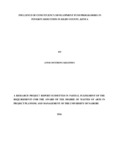| dc.description.abstract | Since independence the Kenyan government has made its core agenda to fight poverty, disease and ignorance. Various development programs such Majimbo (Devolution) system, District Development Grant, Special Rural Development Programme, District Development Planning, Rural Development Fund and the District Focus for Rural Development Strategy had previously been put in place to counter poverty but proved ineffective. Most of these programmes failed to address the needs of local people due to lack of political will, inadequate government funding, lack of appropriate technology, neglect of institutional development, lack of beneficiary participation and poor coordination from top to the bottom. Constituency Development Fund was hence introduced with the objective of initiating development activities at constituency level with the aim of alleviating poverty at grassroots level. Constituency Development Fund was introduced in 2003 through the CDF act in the Kenya gazette supplement no 107(Act no11) of January 2004 in the reign of President Mwai Kibaki. The fund has gone through challenges, repealed severally and currently replaced by NG-CDF, National Government Constituency Development Fund with effect from 19th February 2016. This research project argues that Kilifi County continues to experience high levels of poverty, with half of the population living in deep poverty, which has led to numerous child labour practices such as sex exploitation of children, domestic labour, children selling illicit brew and quarrying among others. The poverty level is morally unacceptable and its complexity could endanger the social fabric, undermine economic development and environment, and threaten stability of the country. This area therefore needs urgent and critical attention in order to achieve the recently adopted Sustainable Development Goals (SDGs). Accordingly, this study investigated the influence of CDF programmes in poverty reduction in Kilifi County and was guided by the following objectives; To determine the extent to which educational programmes influence poverty reduction; To establish the extent to which water and sanitation programmes influence poverty reduction and; To identify the influence of health programmes on poverty reduction; To find out the extent to which economic empowerment programmes influence poverty reduction in Kilifi County. The study employed a descriptive survey research design in collecting the primary data, the Instruments used were questionnaires and interviews. Stratified, Purposive and simple random sampling techniques were used as this was appropriate in giving equal chances to the population. The total population of 384 was considered for study, although focused interview schedules were conducted between the researcher and the fund manager and two CDF committee members. The response rate was 62% meaning that the sample was valid for study. The collected data was analysed using SPSS and content analysis. The findings showed that CDF educational programmes have significant influence on poverty reduction and hence the alternative hypothesis was accepted whereas CDF programmes on economic empowerment, health, water and sanitation had no significant correlation. Therefore it was concluded that most of the CDF programmes appear to have no significant influence on poverty reduction. Based on this, the study recommends that the programme manager should improve on economic empowerment skills and education programmes, especially now that water and health programmes have been devolved under the new CDF act of 2016. There should also be a mechanism of transparent monitoring and evaluating the programmes run by the CDF in the sub-county and this should integrate the economic development index. Furthermore the programme managers should set clear targets and time frames that will enable them evaluate the progress of the programmes and determine their success in poverty reduction. | en_US |



